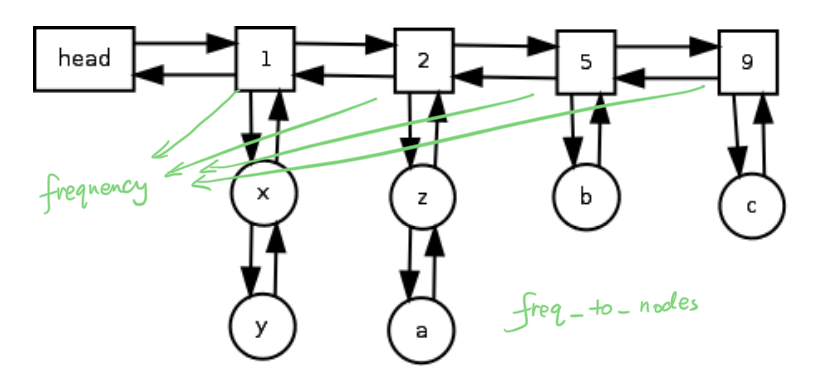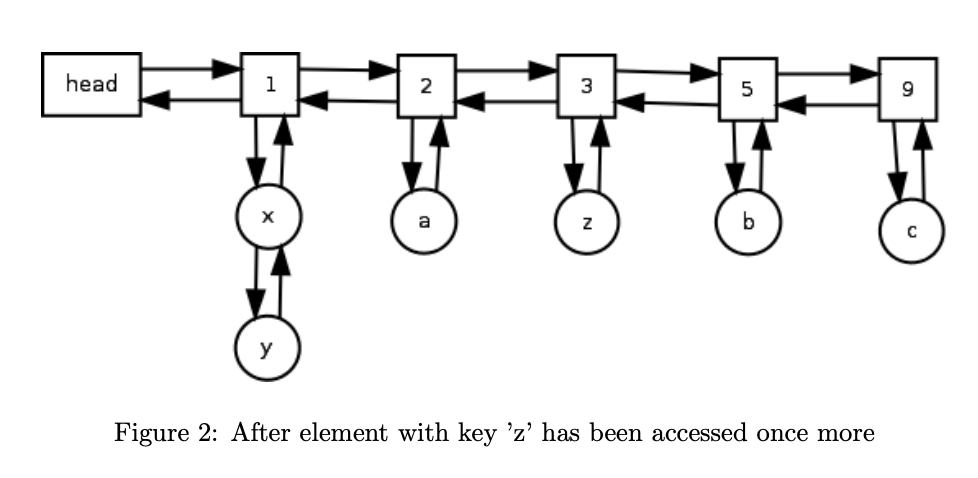LFU Cache
Created: March 31, 2020 by [lek-tin]
Last updated: March 31, 2020
Design and implement a data structure for Least Frequently Used (LFU) cache. It should support the following operations: get and put.
get(key)- Get the value (will always be positive) of the key if the key exists in the cache, otherwise return -1.put(key, value)- Set or insert the value if the key is not already present. When the cache reaches its capacity, it should invalidate the least frequently used item before inserting a new item. For the purpose of this problem, when there is a tie (i.e., two or more keys that have the same frequency), the least recently used key would be evicted.
Note that the number of times an item is used is the number of calls to the get and put functions for that item since it was inserted. This number is set to zero when the item is removed.
Follow up
- Could you do both operations in
O(1)time complexity?
Example
LFUCache cache = new LFUCache( 2 /* capacity */ );
cache.put(1, 1);
cache.put(2, 2);
cache.get(1); // returns 1
cache.put(3, 3); // evicts key 2
cache.get(2); // returns -1 (not found)
cache.get(3); // returns 3.
cache.put(4, 4); // evicts key 1.
cache.get(1); // returns -1 (not found)
cache.get(3); // returns 3
cache.get(4); // returns 4
Illustration


Solution (O(1))
from collections import defaultdict
class Node:
def __init__(self, _key=None, _val=None, _freq=0):
self.key = _key
self.val = _val
self.freq = _freq
self.prev = None
self.next = None
def __str__(self):
temp = "(" + str(self.key) + ", " + str(self.val) + ", " + str(self.freq) + ")"
if self.next:
nextNode = self.next
temp += " -> (" + str(nextNode.key) + ", " + str(nextNode.val) + ", " + str(nextNode.freq) + ")"
class DLL:
def __init__(self):
self.head = Node(None)
self.tail = Node(None)
self.head.next = self.tail
self.tail.prev = self.head
def append(self, node):
node.prev = self.tail.prev
node.next = self.tail
node.prev.next = node
node.next.prev = node
def front(self):
if self.isEmpty():
return None
return self.head.next
def deleteFront(self,):
front = self.front()
self.delete(front)
del front
def delete(self, node):
node.prev.next = node.next
node.next.prev = node.prev
def isEmpty(self):
return self.head.next == self.tail
def __str__(self):
if self.isEmpty():
return "Empty DLL"
else:
return str(self.head.next)
class LFUCache:
def __init__(self, capacity: int):
self.capacity = capacity
self.size = 0
self.min_freq = 0
# key : Node
self.key_to_node = {}
# freq: DLL<Node>
self.freq_to_nodes = defaultdict(DLL)
def get(self, key: int) -> int:
if key not in self.key_to_node:
return -1
# only update node, no new value
self.updateFreq(key)
return self.key_to_node[key].val
def put(self, key: int, value: int) -> None:
if self.capacity <= 0:
return
# key exists
if key in self.key_to_node:
self.updateFreq(key, value)
return
# key doesn't exist
if self.size == self.capacity:
self.evict()
self.addNode(key, value)
return
def updateFreq(self, key, val=None):
oldNode = self.key_to_node[key]
self.freq_to_nodes[oldNode.freq].delete(oldNode)
if self.freq_to_nodes[oldNode.freq].isEmpty():
del self.freq_to_nodes[oldNode.freq]
if self.min_freq == oldNode.freq:
self.min_freq += 1
newNode = Node(key, oldNode.val if val == None else val, oldNode.freq+1)
self.key_to_node[key] = newNode
newFreq = newNode.freq
self.freq_to_nodes[newFreq].append(newNode)
def evict(self):
nodes_at_freq = self.freq_to_nodes[self.min_freq]
node_to_delete = nodes_at_freq.front()
del self.key_to_node[node_to_delete.key]
nodes_at_freq.deleteFront()
if nodes_at_freq.isEmpty():
del self.freq_to_nodes[self.min_freq]
self.size -= 1
def addNode(self, key, val):
self.min_freq = 1
newNode = Node(key, val, self.min_freq)
self.key_to_node[key] = newNode
self.freq_to_nodes[self.min_freq].append(newNode)
self.size += 1
# Your LFUCache object will be instantiated and called as such:
# obj = LFUCache(capacity)
# param_1 = obj.get(key)
# obj.put(key,value)